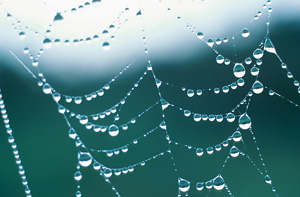
This first, this last:
there’s nothing you wouldn’t say.
Unshockable inclusion your most pure nature,
and so you are like an iron pot—
whatever’s put in, it holds.
We think it’s the fire that cooks the stew,
but, speech, it’s also you:
teacher
of fire-making and stew-making,
orator of all our plans and intentions.
We think we think with a self.
That also, it seems, is mostly you—
sometimes a single spider’s thread of you,
sometimes a mountain.
The late sun paints orange
the white belly of a hawk overhead—
that wasn’t you,
though now and here, it is.
If a hungry child says “orange,” her taste buds grow larger.
If a person undamaged says “hungry child,”
his despondence grows larger.
You are not, of course, omnipotent.
In fact, you do little unaided by muscle, by matter.
And still, present and absent, speech, you change us.
As Issa changed, writing after the death of his daughter,
This world of dew
is a world of dew.
And yet.
How much of you
was left uninvited into those lines.
That silence your shadow, bringing his grieving to me.
For days
I made phone calls to strangers,
the few words repeated over and over,
between the “please, if you have a moment” and “thank you.”
I didn’t expect to make a difference, and didn’t. And yet.
Your vehicles are air and memory,
teeth, tongue, papyrus, woodblocks, iron,
signing fingers, circuits, transistors, and ink.
A wheel is not your vehicle, nor an engine.
Terence was your vehicle,
saying in Latin:
“Whatever is human cannot be foreign to me.”
Your own truth as well—
For of all our parts, you are our closest mirror,
growing thin or fat, muscular, clumsy,
speeding or slowing as we do.
The wolf-child without you called wolf-child, not-fully-human.
You are held, in the forms we can know you,
only by creatures
able to pass you to others
living often in sadness and tiredness, sometimes in hope.
A friend, who is sometimes sad, said this:
“To be able to hope means also that we can regret.”
You rest, fierce speech, in both.
As well as in bargaining, persuasion, argument, gossip,
flirtation, jokes.
Fear, hunger, rage stammer beyond you:
what lives in words is what words were needed to learn.
And so it is good we sometimes set you down
and walk—
unthinking and peaceful, planning nothing—
by the cold, salt, unobedient, unlistening sea.
Only then, without you, are we able to see you completely,
like those wandering monks
who, calling nowhere home, are everywhere home.